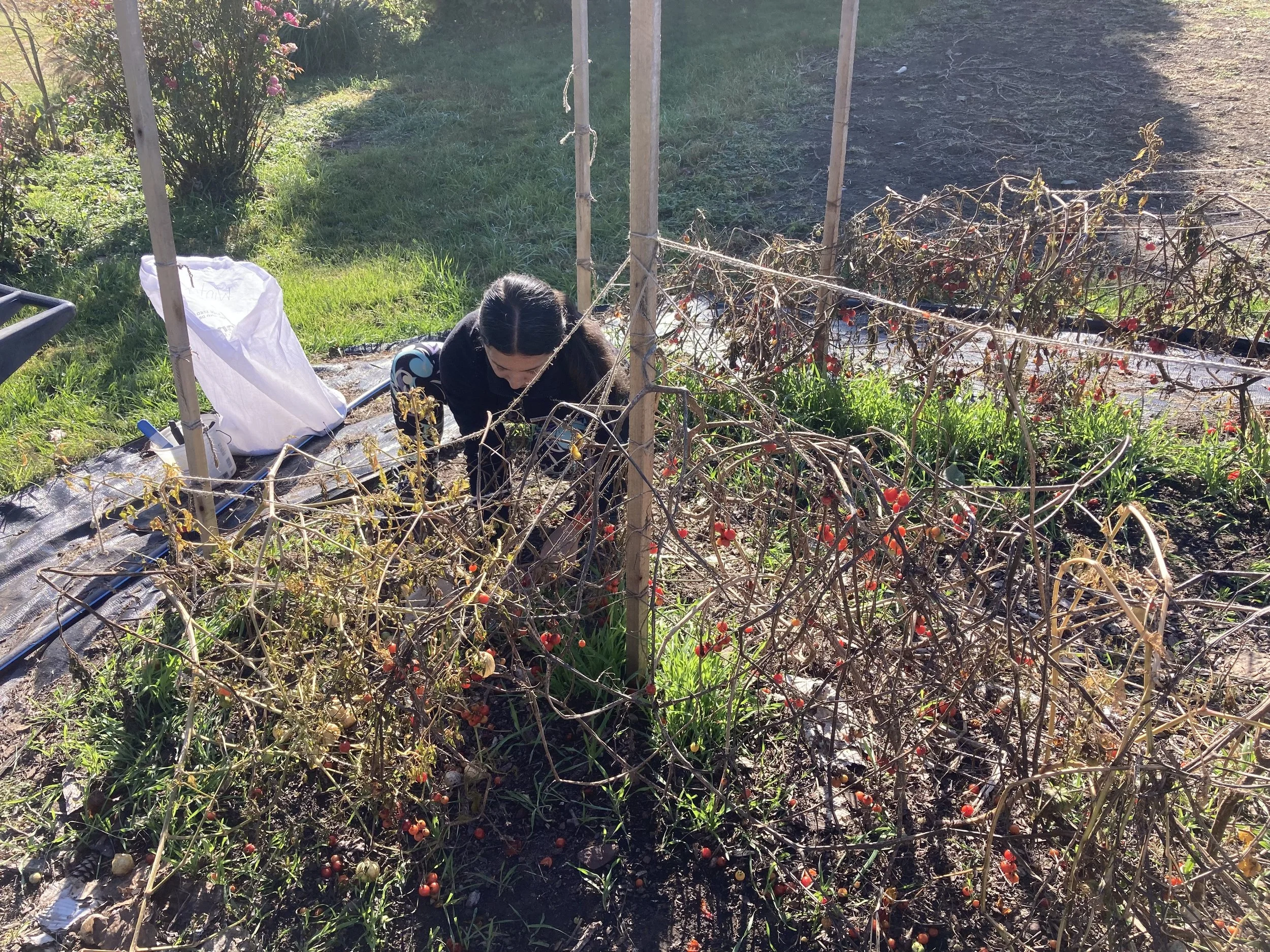
No-till Gardening for a Resilient Future
** Enrollment for 2025 is now closed. Reach out to Rose at gardening4thefuture@gmail.com if you would like to be added to the list for next year’s class. Enrollment for 2026’s course will open in November, 2025***
What are the concrete skills needed to grow food in the face of climate change? How do we build a resilient community while growing food for the future?
We are living in rapidly changing times. This year, unprecedented hurricanes tore through communities, while the vast majority of the country experienced drought. Last year was filled with wild fires and floods. Societal forces seek to separate and divide us. And yet, the earth offers itself as a source of nourishment through it all. How can we learn to work with the earth in the face of all this change? How can we grow food in ways that help build resilient communities?
This course meets once a month for 9 months from February 2025- October 2025 and guides you through the growing season, with lessons geared towards the upcoming month’s gardening tasks and connecting you to local community projects. Readings and other educational opportunities will be provided in-between classes.
Each of the topics below will be explored through the lens of climate and social resilience. This course will deepen one’s connection to the natural world through a scientific, social, spiritual, emotional, and creative lens. There will be space to share knowledge participants bring to the topics, as well as ask questions specific to your gardening projects and interests.
You do not need to be a gardener, or even have a garden to participate!
Apply here!
General Course Overview:
Click here to read a more in-depth description of the content of each course. Each of these topics will be taught through a lens of climate and social resilience. The general overview is as follows:
February- Gardening Design and Seed Ordering
March- Soil Health, Soil Testing, and Soil Remediation
April- Direct Seeding and Cover Crops
May- Transplanting and Disease and Pest Management
June- Water and Irrigation in times of Flood, Drought, and Fire
July- Field Trips to other No-till Farms in the Valley
August- Seed Saving for Climate and Social Resilience
September- Putting your Garden to Bed for the Season
October- Harvest Celebration and Resiliency Maps
2025 Class Schedule
Saturday afternoons from 2pm- 4:30pm, at Astarte Farm, at 123 West St. Hadley, MA on February 22nd, March 15th, April 5th, May 17th, June 14th, July 12th, August 9th, September 13th, and October 18th.
- OR -
Sunday mornings from 10am-12:30pm, at Astarte Farm, 123 West St. Hadley, MA on February 23rd, March 16th, April 6th, May 18th, June 15th, July 13th, August 10th, September 14th, and October 19th.
Please choose the same ONE time slot that you will come to each month.
Course Fees
This course is offered on a sliding scale and with the option for a three-part payment plan. Please see below for guidance on figuring out where you fall on the sliding scale. 10% of all course fees will be given as a land tax to Pequoig Farm. (You can learn more about the concept of a land tax from the Sogorea Te’ Land Trust here).
The low-end cost for this course is $275, and applies to those who have experienced current and/or historical marginalization from the land and/or from other material resources.
The base-cost for this course is $625. This rate is calculated such that with a fully enrolled class, Rose is able to make $30/hr for their labor after paying all costs.
The high-end cost for this course is $975, and applies to those who own a home and/or land, or have access to savings/ inherited wealth/ or high earning power. You can think about this rate as paying base-cost, and then additionally paying the difference between the low-end cost and base-cost, so that another participant can attend at the low-end cost.
The BIPOC full scholarship applies to those who identify as Black, Indigenous, People of Color and is offered as a small step towards repair for those who currently, and whose ancestors historically, have experienced racism through stolen land and exploited labor.
The goal of having all of these options is that as many people as possible will feel able to take this course. If none of these options work for you, please don’t hesitate to reach out at gardening4thefuture@gmail.com with a proposal that would work for you.
Access notes
All classes will take place at Astarte Farm which is located at 123 West St. in Hadley, MA. Please park on West St. on the common (there will be a sign out) and walk into the farm along a gravel driveway. The walk is pretty even, with some potholes, and it is about 150 yards from the parking location to the picnic table where we will gather for each class. The class will take place mostly in one section of the farm, but there will be times we will walk around the 3 acre farm. Parking closer to the picnic table is possible, just reach out to Rose at gardening4thefuture@gmail.com to arrange that option. There is a composting toilet available. Bring your own water and snack and folding chair if that is desired. When we meet inside (usually in February and March) participants are asked to wear masks so that immunocompromised participants can attend. When we meet outside, masks are welcome, but not required. Classes will be taught in a participatory, circle-based style and there will be lots of hands-on learning.
We will begin each class with solo time on the land, and you can expect a check-in each class about how everyone’s projects are going, discussion from readings sent out between classes, as well as hands on learning and observation throughout. There will always be plenty of time for questions and for participants to share the knowledge they are bringing. Reach out to Rose at gardening4thefuture@gmail.com with any other access questions and/or needs.


